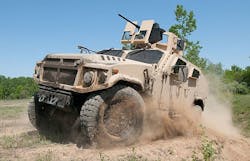Army ponders consortium to develop cyber warfare and cyber security technologies for vehicles
Officials of the Army Contracting Command in Warren, Mich., has released a request for information (W56HZV16VCTOT) for the Vehicle Cyber Technology Consortium Development project.
The consortium will offer prototypes for technology development in vehicle cyber security technologies. The Army Contracting command issued the RFI on behalf of the Army Tank Automotive Research, Development, and Engineering Center (TARDEC) in Warren, Mich.
Army vetronics experts are trying to collaborate with educational, nonprofit, and commercial partners to develop vehicle cyber technologies to improve current U.S. industry, university, and government capabilities.
Consortium members will perform research, development, and engineering on projects that involve:
-- enhancing and defeating cryptography used to secure data in vehicle systems;
-- responding to cyber attacks that penetrate vehicle cyber defenses;
-- creating tools for vehicle digital forensics;
-- finding ways to demonstrate unauthorized control or service denial to a target vehicle;
-- applying computational trust and deep learning to defending against unwanted behavior changes in multi-agent systems;
-- finding ways to measure, analyze, and verify vehicle cyber architectures;
-- developing modeling & simulation tools for testing vehicle cyber defenses; and
-- developing other technologies that identify, isolate, counter, eliminate, and protect against cyber threats to vehicles.
TARDEC will supervise consortium research and development leading to demonstrations of vehicle penetration testing, resilient vehicle architectures, and the modeling, simulation, and analysis of cyber-physical vehicle systems.
Organizations interested should email responses by 29 Jan. 2016 to the Army's Brandon Pender at [email protected], and Troy Haarala at [email protected].
For questions or concerns phone Pender at 586-282-9387, or Haarala at 586-282-7444. More information is online at https://www.fbo.gov/notices/9d58abda558a1f7f20f700d907672dde.
